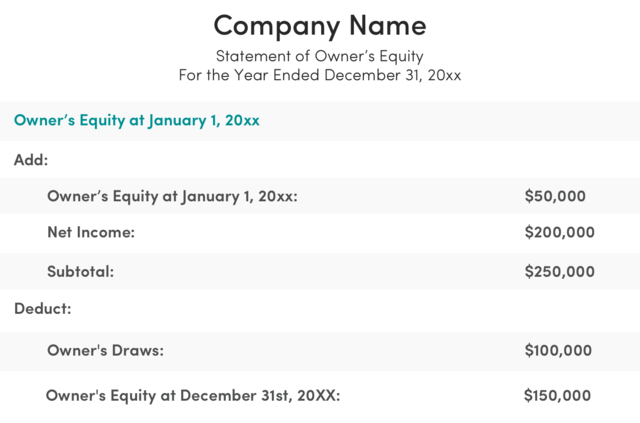Written by: Jacob Dayan
Put simply, equity is money held by a business’s shareholders that is invested in the business.
A statement of owner’s equity — also called an equity statement or statement of changes in equity — is one of the four critical financial statements integral to business accounting. Along with the balance sheet, income statement, and cash flow statement, businesses need to prepare a statement of owner’s equity at the end of the accounting period.

True to its name, the statement of owner’s equity shows changes to the company capital account for a specific period such as profits, dividends, inflow and withdrawal and equity, and more.
While there is some room for flexibility when crafting a statement of owner’s equity, there are several best practice guidelines you should be aware of.
For example, a statement of owner’s equity should have a heading consisting of three lines. Line 1 shows the name of the company, line 2 is the title of the statement (i.e. “statement of owner’s equity”), and line 3 outlines the accounting period reported on the statement.

To see the statement of owner’s equity in action, let’s create one for a fictional sole proprietorship, which we will call “Wojciech’s Plumbing Services”. Wojciech’s outsourced small-business accountant wants to prepare financial documents for the entire year of 2020. At the culmination of the 2019 reporting period, Wojciech’s Plumbing Services had $200,000 in capital. After preparing the income statement, the accountant knows that Wojciech’s Plumbing Services had a net income of $78,000. During this period, Wojciech put $5,000 of his own money into the business. He has also withdrawn $40,000.
Wojciech’s accountant now needs to format all of this information into an easy-to-read financial statement. First, he creates the statement heading, following best practice rules. Then he organizes the financial information in a concise manner. This is how it turns out:
This is a very basic example, but the same principles apply to businesses and corporations of all sizes. However, the bigger the business, the more moving parts; for example, a corporation with shareholders will have separate sections for each shareholder and more line items, such as dividends paid.

Most small business owners started their companies because they were experts in providing a good or a service — not at balancing a book. In addition, small business and startup accounting can be difficult and multi-faceted. Nevertheless, good accounting and bookkeeping are imperative to manage any company’s financial health, guide decisions for growth initiatives, and ultimately ensure your business is in good standing with its tax obligations throughout the year. However, it can also be tedious, complicated, and time-consuming — especially for those who own smaller businesses or sole proprietorships. Additionally, the IRS can be unforgiving when it comes to mistakes — for instance, filing your payroll taxes just one day past the deadline incurs a 2% penalty. To make matters worse, these penalties can add up to a hefty 15% of the initial amount owed. On a more positive note, accountants with experience in small business taxes can find your business hidden savings.
Outsourcing accounting and bookkeeping to an outside firm is a simple and rewarding process that allows business owners to spend less time worrying over books and more time, well, running their businesses. Every day, more and more business owners trust FinancePal’s small business accounting services.

Jacob Dayan is a true Chicagoan, born and raised in the Windy City. After starting his career as a financial analyst in New York City, Jacob returned to Chicago and co-founded FinancePal in 2015. He graduated Magna Cum Laude from Mitchell Hamline School of Law, and is a licensed attorney in Illinois.
Jacob has crafted articles covering a variety of tax and finance topics, including resolution strategy, financial planning, and more. He has been featured in an array of publications, including Accounting Web, Yahoo, and Business2Community.

Nick Charveron is a licensed tax practitioner, Co-Founder & Partner of Community Tax, LLC. His Enrolled Agent designation is the highest tax credential offered by the U.S Department of Treasury, providing unrestricted practice rights before the IRS.
Read More
Jason Gabbard is a lawyer and the founder of JUSTLAW.

Andrew is an experienced CPA and has extensive executive leadership experience.
Discussed options for my business with Brian and he was very helpful in suggesting how best to handle it.
Contact us today to learn more about your free trial!
By entering your phone number and clicking the "Get Custom Quote" button, you provide your electronic signature and consent for FinancePal to contact you with information and offers at the phone number provided using an automated system, pre-recorded messages, and/or text messages. Consent is not required as a condition of purchase. Message and data rates may apply.
By entering your phone number and clicking the “Get Started” button, you provide your electronic signature and consent for FinancePal to contact you with information and offers at the phone number provided using an automated system, pre-recorded messages, and/or text messages. Consent is not required as a condition of purchase. Message and data rates may apply.
